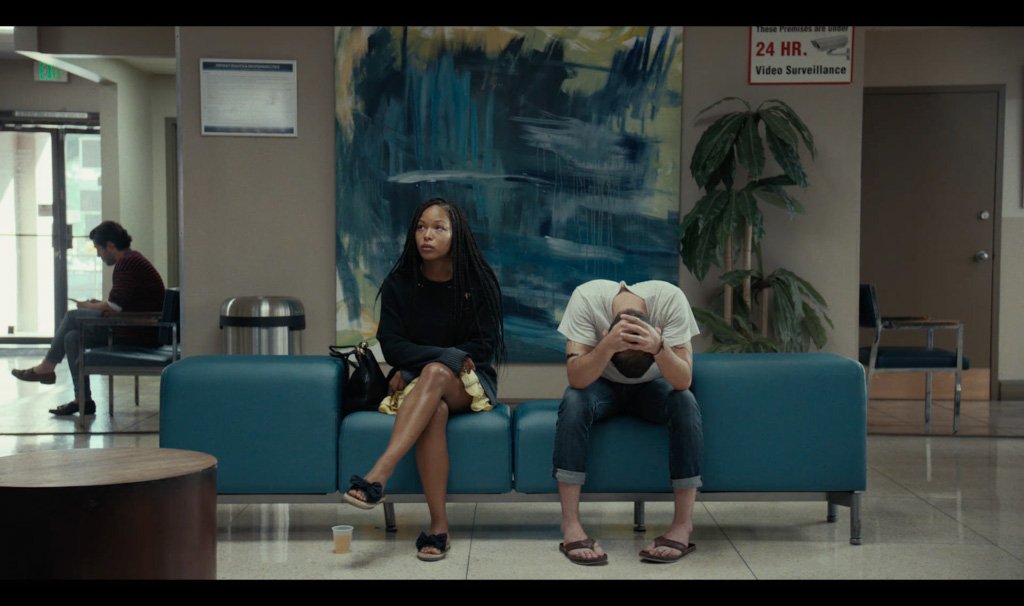Test Pattern holds a mirror to our patriarchal society and exposes how the system re-victimises women of colour after sexual assaults, while highlighting cultural contrasts.
Recent years have seen the rise of movements against sexual harassment, that aim to create a society free of gender-based discrimination in the workplace and beyond. Think of how much an impact Time’s Up and the #MeToo movement have had and still have With more than a third of women in the United States victimized by sexual assault in their lifetimes, and eighty percent of those women experiencing significant short- or long-term impacts including PTSD, it becomes clear how vital and important it is to actively engage with this topic.
Though victims include women from all backgrounds, ethnicities and levels of socio-economic status, it cannot be denied that in parts of the US, in particular the still very much segregated Texas, a majority of these women do not have proper access to the system that is supposed to protect them. I was shocked when I came to know that over 20.000 so-called rape kits are basically collecting dust in hospitals, besides which only 13% of emergency rooms has a Sexual Assault Nurse Examiner, who is qualified to administer a rape kit, on staff.
Test Pattern delves right into the rabbit hole of US health care and its policing, and lays bare the harsh reality of being a woman of colour and in need of a rape kit. Shatara Michelle Ford’s debut feature follows the budding relationship of an interracial couple in Austin, Texas – and its undoing. Centring around national discussions of health care and policing, the #MeToo movement, and race in America, Test Pattern is a realist drama that follows both the shame and guilt felt by many women following a sexual assault, and white societies’ response to that assault. It explores institutional racism from a black female point of view. We follow Renesha (Brittany S. Hall, Ballers, Nappily Ever After) and Evan (Will Brill, The OA, The Eyes of My Mother) from the moment they meet, to first dates, to a couple year in the future where they are living happily and full of love for each other in a nice house in the suburbs.

She is a tough businesswoman turned non-profit entrepreneur; he is a shy tattoo-artist. When Renesha lands a new job, her friend Amber (Gail Bean, Unexpected, Insecure) invites her for a night out. Promising Evan she will be back before midnight, Renesha is fully intent on having a girl’s night. When Amber gets flirty with one of two guys they meet at the bar, Renesha is persuaded to live a little and have a drink with them. After also accepting a weed-infused gummy bear, Renesha starts to feel unwell and wakes up the next morning in a hotel room with one of the guys, and a massive headache. She arrives home dazed and confused, and after apologising a million times without exactly knowing what for (as she has only about 10 divided seconds of memory from the night), Evan decides they need to go to the hospital for a rape kit – their only course of action to find the guy who assaulted her. With one of the biggest sources of evidence being her morning pee, it is a race against the clock for Renesha (and Evan) to find a hospital willing to conduct the examination.
A test pattern is a fixed picture broadcast by a television station to assist viewers in adjusting their receivers (according to Merriam-Webster). I’d like to think that the film’s title encourages us to adjust our mental receivers as well, it gives us a peek into the reality of a woman of colour coming to terms with her suspected sexual assault. Her interracial relationship adds an extra dimension to the narrative plot, as it highlights the contrasts between what a predominantly white culture is convinced should happen (victims of sexual assault should report it, and we will fight for them when they do), and what the reality is for a woman of colour in Texas’ most segregated city. However, the focus is not on the horrifying experience itself, but on the conversations between Renesha and Evan and the emotions both of them go through. With a limited budget, and 82 minutes of final edit filmed over twenty-one days, they have rightfully been awarded with the Narrative Features Jury Award by the New Orleans Film Festival (2019).
Test Pattern, however, is not just an interesting narrative feature, it is also part cine-activism. Its strength lies not only in its message, but also in the delivery of that message. It is one of the first films on the new online film platform Pepr, an initiave of Full Colour Entertainment and streaming service Picl. Pepr provides a platform for black filmmakers and stories from the African community. Director Shatara Michelle Ford also made sure a woman was at the head of every department on Test Pattern; the protagonist and the two supporting actresses are black women; the total production crew was comprised of more than 60% people of colour; and more than 40% of the cast and crew self-identified as LGBTQ+. Looking at the film knowing all this, it becomes clearer and more obvious that however sweet and caring Evan may be as a boyfriend, he still symbolically represents white patriarchal society and inadvertently acts on the values dominant in that culture. He is used to the system working for him, so it has to work for Renesha as well.
Over the course of the film, we can not only feel the distance grow between Renesha and Evan, but the distance is also visually represented in the cinematography. Production Designer Eloise Ayala (The Maestro, Crazy Bitches) paid special attention to the visual context in which the narrative takes places. Their relationship, for example, is introduced as the colour teal. In the flashbacks of how Renesha’s and Evan’s relationship grows we can see that Evan is mostly surrounded by overgrown plants and the colour green. The bigger the gap between Renesha and Evan grows, the lesser and less the colour teal is shown and the flourishing green plants on set are thinned out and live plants are replaced by dead ones or swapped out for ones with a more muted tone. Director of Photography, Ludovica Isidori (The Blackout, Intercept), further drained out the colour by changing the colour temperature, contrast ratio, and lens selection. To create a feeling of a stalled relationship, they used a longer lens and shot the actors wide open. The colours thus are naturally desaturated and the shallow depth of field made them feel physically further apart.
In Test Pattern, Shatara Michelle Ford explores the power dynamics between men and women in a white patriarchal society. They (Ford) highlight Black people’s navigation of oppressive whiteness and how the system is flawed, particularly for women of colour. Test Pattern delves deeper into the social conditioning women face when navigating sex in American society. True to how our lived experience is cannot be described in one genre, the film can be divided into three parts: romantic comedy (before Renesha’s assault), psychological thriller (during), and realist drama (after). It demonstrates that for each individual, moments in life can become painful or light-hearted depending on the context. Where Renesha and Evan are at first portrayed as equals, the second half of the films shows the small cracks between the two realities they live in – Evan’s reality is part of a white patriarchal society with no understanding of Renesha’s reality, her lived black experience of that society.
The scoring and cinematography at times amplify the absurdity of the whole situation. Slow-motioned images of Renesha’s (who is still holding her morning pee in a plastic cup) and Evan’s third hospital attempt are accompanied by a theatrically tragic Tchaikovsky’s Waltz of the Flowers. It is sad that even through the scene-cancelling symphony, we can see exactly how their attempt will play out. We don’t even need to see and hear Renesha’s phone call with the Austin Police Department to know that there is nothing they can do. It is no wonder that 75% of sexual assault victims do not report their assault, because even if they do, only 5 out of 1000 perpetrators gets caught. The system is clearly still not made for women like Renesha. A lot more is still needed to fully adjust our receivers, but Test Pattern sure is a good way to start the process of recalibration.
Test Pattern was released on February 19 in virtual cinemas in the US via Kino Marquee. A Kino Lorber release, the film is now available on digital and home video.

